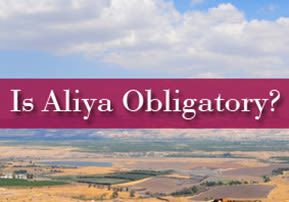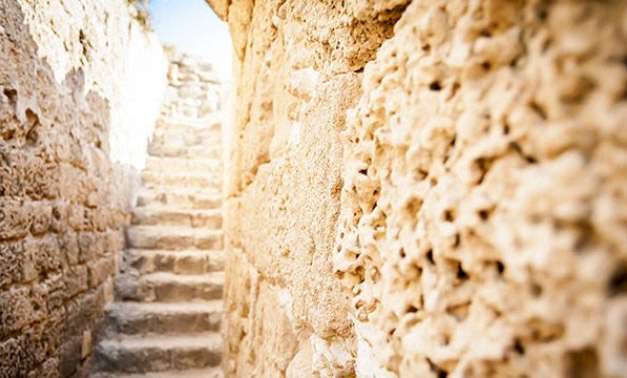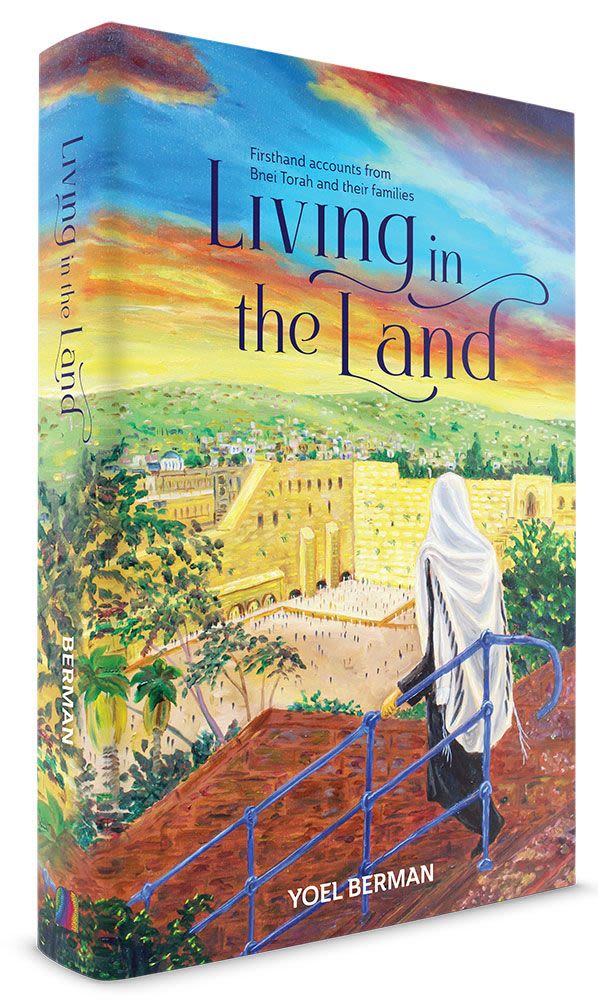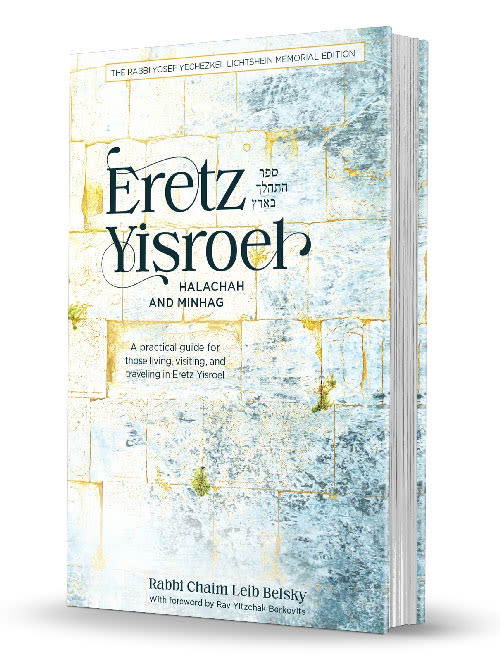Avi: A Jew that strives to be holy must move to Eretz Yisroel as soon as possible.
Alan: That may be true on some level, but the Jewish people are first and foremost about mitzvot, as the Torah warns:
However, if you will not listen to Me and do all of these commandments; if you will deride My laws and detest My judgments and not do all My commandments but void My covenant, then I will do the following to you … (Vayikra 26:14-16) …of which living in Eretz Yisroel is but one, and only when it is safe to do so.
How much easier is it to do more mitzvot, particularly that of Torah study, in the Diaspora today than in Eretz Yisroel, and to beautify the mitzvot that we do there. At this stage of history, the argument goes, we Jews of the Diaspora can serve God BETTER here in Chutz L’Aretz (outside of Eretz Yisrael) than if we lived in b’Aretz — in the land.
After all, what is Eretz Yisrael? It is only a land. And what do you do on a land? You live there. And what is special about living in Eretz Yisrael? This:
For the land you are about to possess is not like Egypt from where you came, and in which if you sowed seeds you had to bring water to them as you would for a garden of green herbs. The land you are about to possess has mountains and deep valleys and is watered by rain from the sky — a land which God your God cares for, which God your God pays attention to continuously the entire year. (Devarim 11:11-12)
But that is only during times when the Jews are living there; when the Jews are in exile, so is the Shechinah — the Divine Presence. Today it is about doing mitzvot, as many as you can. It is about learning Torah, and with as much yishuv hada’at — calmness — as possible. It’s harder to be a good Jew in Eretz Yisroel, seemingly, than it is in the Diaspora.
Avi: Oh really? Let’s take a moment or two to show that just the opposite is true.
The Talmud states: “Three wonderful gifts were given by The Holy One, Blessed is He, to the Jewish people, and all of them are acquired through yesurim — hardship. They are Torah, Eretz Yisroel, and The World-to-Come.” (Brochot 5a)
Well, THAT’S not good news, huh, Alan? No wonder the Western world, in spite of landmark statements such as “no pain, no gain” shuns Torah, Eretz Yisrael, and the World-to-Come. It seems that they have limits as to how much pain for how much gain.
The statement of the Talmud is reminiscent of that ominous statement from the rabbis of the Second Temple Era: “According to the pain is the reward.” (Pirkei Avot 5:22)
Thus, it seems that the Jewish people are about more than kedushah — holiness — and mitzvot. It seems that we’re about yesurim – tribulations – as well, because we are certainly about Torah, Eretz Yisrael, and the World-to-Come and they ALL come through yesurim. (It’s a good thing that we don’t encourage conversion to Judaism because it would be quite a tough sell given this yesurim business.)
The question is, why? In answering this question, the Ramchal, Rabbi Moshe Chaim Luzzatto, wrote:
God’s purpose in creation was to bestow of His good to another … Since God desired to bestow good, a partial good would not be sufficient. The good that He bestows would have to be the ultimate good that His handiwork could accept. God alone, however, is the only true good, and therefore His beneficent desire would not be satisfied unless it could bestow that very good, namely the true perfect good that exists in His intrinsic nature. His wisdom therefore decreed that the nature of His true benefaction be His giving created things the opportunity to attach themselves to Him to the greatest degree possible. For the intended purpose to be successfully achieved, means must exist through which this creature can earn perfection. Man was therefore created with both a yetzer tov and a yetzer hara. He has the power to incline himself in whichever direction he desires. The Highest Wisdom decreed that man should consist of two opposites. These are his pure spiritual soul and his unenlightened physical body. Each one is drawn toward its nature, so that the body inclines toward the material, while the soul leans toward the spiritual. The two are then in a constant state of battle … (Derech Hashem 1:2:1-1:3:2)
Summarizing the words of the Ramchal, we were made to eventually go to the World-to-Come. However, the World-to-Come is only meaningful if it is the result of our own efforts, which means using our free-will to incline ourselves in the direction of our yetzer tov, which means constantly increasing our spirituality. According to the Ramchal this seems to entail a sacrifice of things our bodies desire, by which we earn our portion in the World-to-Come, or in the words of the Nefesh HaChaim, BUILD our portion in the World-to-Come.
And THAT is the source of our yesurim: the sacrifice of material comforts — the desires of the body — when they interfere with the opportunity to increase spirituality — the desire of the soul. And lest you doubt these words simply check out which part of you starts to panic when you contemplate their meaning: your body or your soul?
Alan: It certainly sounds like the life of a Torah-observant Jew in Eretz Yisroel.
Avi: There is another more meaningful way with which to refer to this idea of yesurim: mesirat Nefesh, self-sacrifice. “Mesirat Nefesh” is one of those phrases that is used often but rarely understood. Literally it means “the handing over of the Nefesh”, the Nefesh being the lowest of the five levels of our soul: Yechidah, Chayah, Neshamah, Ruach, and Nefesh. An act of mesirat Nefesh is one that hands over the part of our soul called “Nefesh”, often referred to as our “Animal Soul” since we share this level with animals as well.
Though completely spiritual, the Nefesh is the only part of the soul that can be used for a sin as the Torah says: “A person (Nefesh) that will do …” and “the people (nefashot) that do ...” (Vayikra 18:29). This is because it is low enough in the spiritual chain that it can interface with the physical body, acting in the body like an engine does in a car, just as it does for animals as well.
The fact that a person can sin using his Nefesh means that the Nefesh can learn to relate to the desires of the body, and that denial of the desires of the body has an impact on the Nefesh as well. Therefore, when one sacrifices such desires for a spiritual goal it is as if the Nefesh itself has been sacrificed, or “handed over” to the higher cause, resulting in additional reward in the World-to-Come, for it is mesirat Nefesh (dedication) that is the currency of the World-to-Come.
Indeed, the whole point of a mitzvah is the opportunity for mesirat Nefesh that it creates. It is not the act of the mitzvah itself that counts but the effort necessary to perform whatever aspect of the mitzvah a person is capable of performing (Brochot 6a). It is an oxymoron to look for an “easier way” to perform a mitzvah, and more importantly, it is not the Jewish way.
Hence, though we are not commanded to be masochists we are nevertheless expected to not run away from difficult situations either. Quite the contrary, though we don’t create them on our own we do relish them with delight when they come our way, recognizing that the more mesirat Nefesh we are forced into the more reward we earn in the World-to-Come.
Now, Alan, by plugging the concept of mesirat Nefesh into the equation, yields:
Three wonderful gifts were given by The Holy One, Blessed is He, to the Jewish people, and all of them are acquired through mesirat Nefesh, through the sacrificing of material desires for the sake of spiritual gain. They are Torah, Eretz Yisrael, and the World-to-Come.
In conclusion, this would mean that Torah is also a spiritual thermometer, in this case to measures one’s willingness to be moser Nefesh. The mitzvot are actually vehicles to draw out and measure one’s ability of dedication, mesirat Nefesh: the more one is willing to sacrifice the desires of the body to accomplish the goals of the soul, the larger a portion in the World-to-Come he has earned.
And, says the Talmud in placing the gift of Eretz Yisrael after the gift of Torah, how much more so is this true of Eretz Yisrael. More than just being a land, Eretz Yisrael is a barometer of a Jew’s level of mesirat Nefesh and therefore opportunity to earn reward in the World-to-Come. The “dochek” (financial straits) of Eretz Yisrael is not a reason to avoid her, but a reason to pursue her, just as in the case of Torah itself.
Alan: Avi, do you by any chance have the email and phone number of Nefesh B’Nefesh?
Neighbors are staying put, Torah life outside Israel goes on, so what could be wrong? And if there is something wrong with this picture, is it something that is really that bad…will there be a consequence? And, if there will be a consequence, will it be one that we can live with?
***
Pinchas Winston is the author of over 95 books on various topics that deal with current issues from a traditional Jewish perspective. He has also written on the weekly Torah reading since 1993, called “Perceptions”, as well as on current topics and trends affecting Jewish history, past and present. One of his missions is to make the depth and beauty of the more mystical teachings of Torah understandable and accessible to those who can really benefit from them. Visit his website at thirtysix.org.










Tell us what you think!
Thank you for your comment!
It will be published after approval by the Editor.